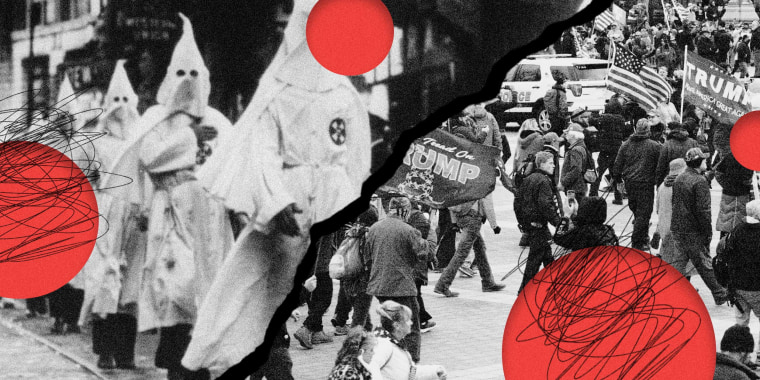The Ku Klux Klan Act, a post-Civil War law designed to break up white supremacist terrorist groups, got attention last year when victims of the 2017 riot in Charlottesville, Virginia, successfully used it to sue extremist groups that participated.
The law has stayed in the public consciousness thanks to the NAACP, Democratic lawmakers and the attorney general of Washington, D.C., who’ve cited it in suits seeking damages from former President Donald Trump and extremist groups involved in the Jan. 6 riot. (Trump isn't a party in the Washington case ... for now.)
The MAGA movement is no different from other bigoted, fascist movements we’ve seen in our nation's past.
Tuesday’s House Jan. 6 committee hearing focused on Trump World's ties to, and incitement of, extremist groups to stop certification of his 2020 election loss. And it was a gift to all of the current cases premised on the Ku Klux Klan Act.
We got evidence of communication between Team Trump figures and extremist groups like the Oath Keepers and the Proud Boys. But the hearing also helped the KKK Act cases by showing commonality between the violently antidemocratic MAGA movement that stormed the Capitol and the violently antidemocratic Klan chapters that have historically patrolled communities for similarly bigoted reasons.
Quickly, some history.
The KKK Act was enacted in 1871 to fight white supremacist terrorism after emancipation. Under the law, using “force, intimidation, or threat” to violate someone’s civil rights — like voting — has been deemed a federal crime. And fundamentally, that’s what the MAGA movement set out to do on Jan. 6: overturn an election using baseless voter fraud claims in part to discount Black votes.
But more comparisons abound. Former Oath Keepers spokesperson Jason Van Tatenhove testified that the group’s criminally indicted leader, Stewart Rhodes, used misnomers to hide his organization’s extremist goals and help recruitment.
“He was always looking for ways to legitimize what he was doing,” Van Tatenhove said, “whether by wrapping it in the trappings of ‘It’s not a militia, it’s a community preparedness team. We’re not a militia, we’re an educational outreach group. It’s a veterans support group.’”
But it’s all a front, Van Tatenhove said. “He’s a militia leader.”
Sounds familiar. The government called out this tactic in a successful 1965 KKK Act case against the Original Knights of the Ku Klux Klan over political terrorism in Louisiana:
The evidence clearly establishes that the Anti-Communist Christian Association is not a bona fide, independent organization but is the defendant klan thinly disguised under a respectable title. At an earlier time, the klan’s dummy organization was called the Bogalusa Gun Club. The defendants’ efforts to appear respectable by association may also be reflected in the location of the klan’s principal office in the Disabled American Veterans Hall.
This case also cites an attempt to purge Black people from voter rolls as evidence of a racist civil rights violation. (Reminder: Throwing out Black votes was a major part of Team Trump’s Jan. 6 plot, as well.)
But the MAGA-KKK comparisons don’t stop there.
Multiple KKK Act lawsuits have cited Klan chapters’ use of weapons to intimidate their perceived enemies.
The aforementioned 1965 case refers to Klan members’ using clubs, belts and other weapons to chase Black people from a park, while a 1968 case in Alabama cited Klansmen who took weapons to a cross burning as evidence of violent intimidation. Trump World borrowed these tactics on and around Jan. 6, as well.

Former Trump White House staffer Cassidy Hutchinson testified last month that Trump demanded that armed people be allowed at his pre-riot speech at the Ellipse on Jan. 6 before he sent them to disrupt the electoral vote count at the Capitol. And we’ve heard testimony from other state and local officials who received violent threats from Trump supporters after he targeted them with election fraud lies.
At Tuesday’s hearing, Rep. Jamie Raskin, D-Md., read some of these names: Arizona GOP state Rep. Rusty Bowers, Georgia election workers Shaye Moss and Ruby Freeman and Georgia Secretary of State Brad Raffensperger. This intimidation, Raskin said, made them “prisoners in their own homes.”
The historical ties are clear. The MAGA movement is no different from other bigoted, fascist movements we’ve seen in our nation's past. It should be dismantled and destroyed, and the KKK Act might be the best way to do that.
